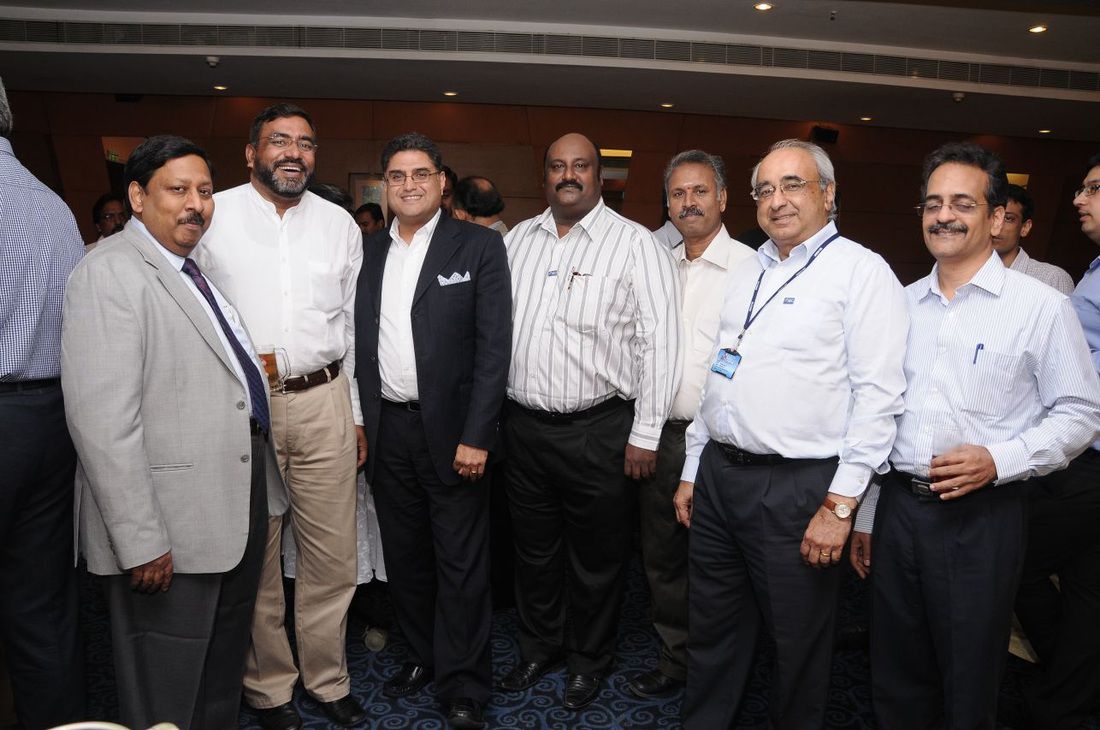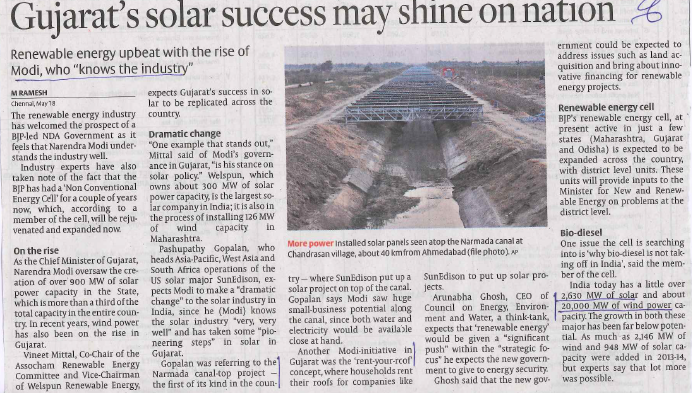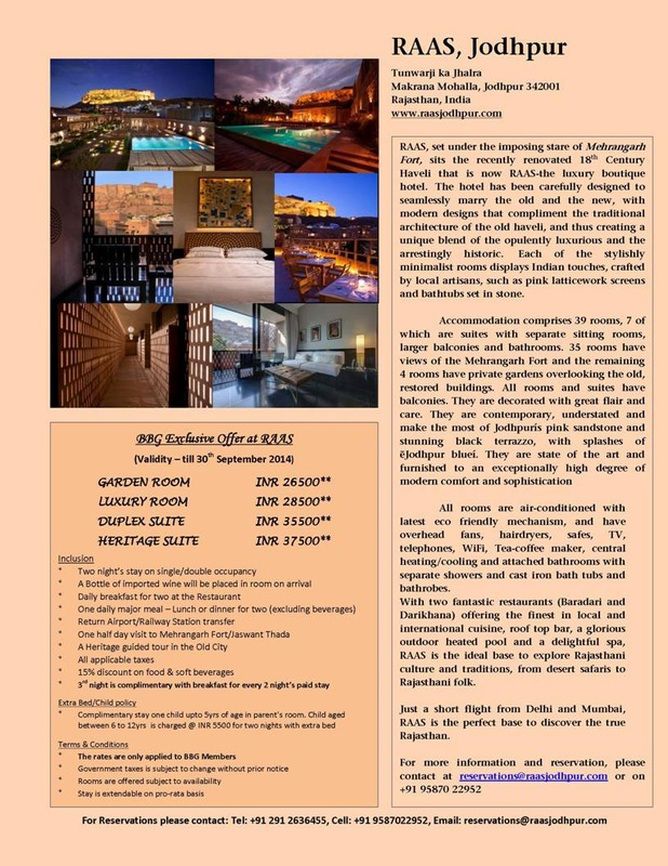The UK Government congratulates India’s Prime Minister-elect, Narendra Modi, and the Bharatiya Janata Party (BJP) on their election success.
Foreign Minister William Hague said:
“I congratulate Narendra Modi and the BJP on their success and look forward to forging an even closer partnership with India in the months ahead.
With 815 million eligible voters, 915,000 polling stations, and nine days of voting over five weeks, India has seen the largest parliamentary election in the world.
The UK has strong ties with India and the British Government looks forward to working with the new Indian Government to build on this relationship and deliver security, growth and prosperity for both our nations.”
Registrations for CONNECT ’14, BBG’s national convention will be opening shortly. Prior to that Team BBG Delhi thought they should give us notice of what the CONNECT ’14 will offer delegates.
If you have had a chance to look at the website (www.britainindiaconvention.com) you will know that the outline programme is coming together. The team is still working on the details with our various partners but it is clear already that there will be excellent participation from India and the UK.
The various partnerships mean that CONNECT ’14 delegates will enjoy the following:
8/9 October
Complimentary participation in the CII’s Global SME Convention at the Habitat Centre – this will offer B2B meeting opportunities with companies large and small form India and other partner countries – see http://www.cii.in/Events
We will arrange free transportation between the Taj Palace Hotel and the Summit venue, the India Habitat Centre
10 October
Two events we are running in partnership with:
– the Indian Angel Network – a round-table on how to access angel investment money for your businesses
– FICCI – a broader meeting (followed by lunch) on investment between the UK and India
We will arrange free transportation between the Taj Palace Hotel and the meeting venue
The Convention proper will open that evening in the beautiful gardens at the home of the British High Commissioner, Sir James Bevan, who will host a reception and dinner, for which BP are the Platinum Partners, featuring Indo-British success stories (and drinks provided by Diageo!)
We will arrange transportation between the Taj Palace Hotel and 2 Rajaji Marg
11 October
The Convention itself, starting with Sector Summits and offering a wide range of programmes through the day, both in plenary and in our different Zones, including more opportunities for B2B meetings (which you will be able to arrange ahead of time through the CONNECT ’14 website). We will also be offering catalogue exhibition space just for BBG members at the Convention, and a special BBG Zone for each BBG to be at home.
The day will conclude with an evening reception organised in partnership with the British Council, and then a bigger, more informal party in the Convention Village.
12 October
We are working on a range of leisure opportunities for delegates ranging from golf, to test drives and tourism, and even a brunch organised specifically for BBG members from across India.
Delegates will enjoy special rates at the Taj Palace Hotel for the nights of 10 and 11 October, and special discounts on Virgin Atlantic and Indigo, our Convention Partner Airlines. Upon completing Delegate Registration formalities on the CONNECT ’14 website, the details of how to book through these partners will be sent across to you. We will be letting you know when registration is open.
The delegate fee for all BBG members for the Convention will be INR 9,500 per person which includes access to all Convention events. There will be a different rate for non-BBG delegates coming from the UK.
More details at www.britainindiaconvention.com

British South Indian Chamber of Commerce (BSICC) in partnership with UK Tamil Nadu Chamber of Commerce (UKTNCC) organised the 2nd UK Tamil Nadu & Puducherry Business Meet 2014 on 8th May 2014 at Houses of Parliament, Westminster, London. BSICC has been conducting few business meetings over the years, such as UK South India Business Meet, UK Karnataka Business Meet, UK Kerala Business Meet and various other state Business Meets at the Houses of Parliament.
This year UK Tamilnadu business meet was chaired by Mr Virendra Sharma MP (Southall, UK). The audience included representatives from Tamil Nadu, Puducherry, Members of House of Lords & House of Commons, representatives from other Indian states/ other countries and businessmen from India who are successful in UK. One of the notable attendees for the business meet was Mr.Bharat Joshi, British Deputy High Commissioner in Chennai, who was also the Chief Guest of the day.
The event started with a formal welcome speech by BSICC Patron Mr.Virendra Sharma MP, Ealing Southall. This was followed by a brief overview of UK Tamil Nadu & Puducherry Business Meet by Mr.Jacob Ravibalan, BSICC Vice Chair for Tamil Nadu and Puducherry and Founder Director UKTNCC. Mr.Bharat Joshi, British Deputy High Commissioner based in Chennai, spoke about the historical relationship between UK and Tamil Nadu. Following this, Mr. Hasmukh Vora, President of Hindustan Chamber of Commerce, based out of Chennai, Tamil Nadu, offered his perspective of pursuing business activities in Tamil Nadu & Puducherry.
Our Chairman, Christie spoke about how good an investment destination Tamil Nadu and Puducherry is. Dr. R. Seetharaman who is the Group Chief Executive Officer of Doha Bank in Qatar gave a detailed information about some of the opportunities for UK residents and Global Tamilians in the Gulf. Mr.David Happy, who was till recently the Vice President EU Affairs for Samsung Electronics, spoke about India UK collaborations and how the UK is a hugely effective springboard into the rest of the EU-27 for Indian companies and twice as big as the USA and a wealthy region.
Mr. Velou Singara of UKTNCC spoke about various business opportunities in Puducherry for UK companies. Mrs Kamala Sekar who was till recently the Head of Export Finance at UKTI spoke about the channels of support from UK public sector and BSICC/ UKTNCC. UKTNCC Founder Director Mr. Sundar Subbiah offered the strategy and roadmap for UKTNCC. Vote of Thanks for given by Siv Matchendran – Founder Director of UKTNCC.
Mr. Karthik Durgaprasad Founder of UKTNCC gave more details about the business meet “UKTNCC was launched in 2013. The business meet was a huge success and we had participation of more than 150 delegates from Tamil Nadu, Puducherry, United Kingdom and Middle East participating in the meet. Following the business meet, we are hopeful that few UK based companies will start exploring business opportunities to invest in Tamil Nadu and Puducherrry.
From BSICC’s side Mr. Sujit Coordinated the entire event, who also said to us that the next South Indian Business event would be around the first week of July.
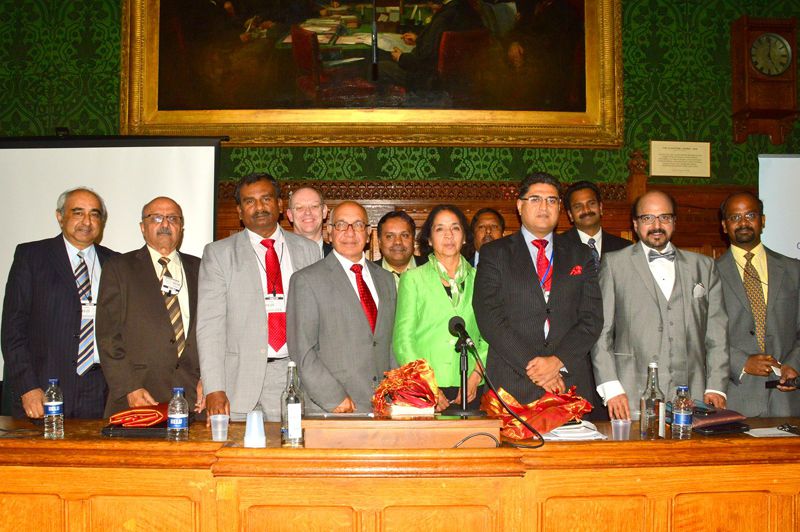
British High Commissioner to India, Sir James Bevan, today conducted the honours presentation ceremony for Ratan Tata, Chairman Emeritus of Tata Sons. The High Commissioner presented Mr Tata with the Knight Grand Cross of the Order of the British Empire (GBE) on behalf of Her Majesty Queen Elizabeth II. Mr Tata has been awarded an honorary GBE, one of the highest civilian honours conferred by the UK, in recognition of his services to UK/India relations, inward investment to the UK and philanthropy.
Speaking after the ceremony, Sir James said: “Ratan Tata’s leadership, vision and integrity will remain the gold standard for generations of aspirational British and Indian business people. His contribution to the deep ties that exist between the UK and India has been invaluable”.
Further information:
Her Majesty Queen Elizabeth II conferred on Mr Tata the honorary award of Knight Commander of the Order of the British Empire (KBE) in 2009. Mr Tata is the only Indian national to be awarded the GBE since India became a republic in 1950.
Mr Tata is a member of the UK-India CEO Forum and the British Prime Minister’s Business Advisory Group. As Chairman of Tata Sons, he oversaw the Tata Group, one of the leading foreign investors and employers in the UK. Under his leadership the UK benefited from significant inward investment from Tata companies. Tata are now the largest manufacturing employer in the UK.
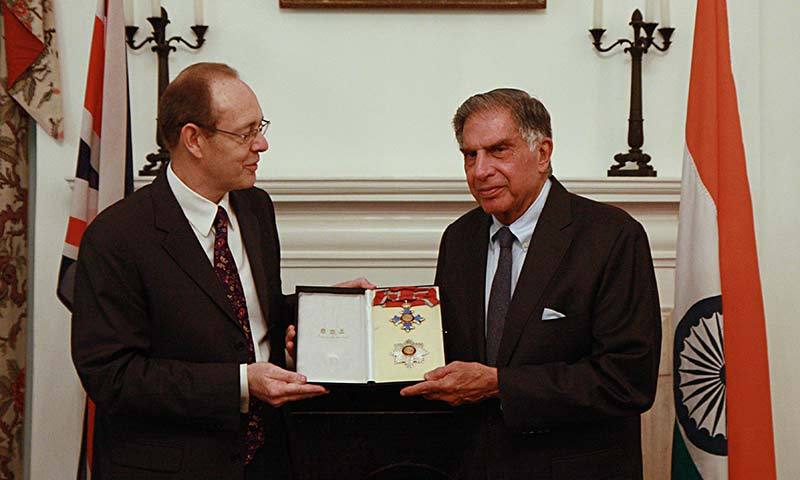
British High Commissioner to India, Sir James Bevan, today conducted the honours presentation ceremony for Ratan Tata, Chairman Emeritus of Tata Sons. The High Commissioner presented Mr Tata with the Knight Grand Cross of the Order of the British Empire (GBE) on behalf of Her Majesty Queen Elizabeth II. Mr Tata has been awarded an honorary GBE, one of the highest civilian honours conferred by the UK, in recognition of his services to UK/India relations, inward investment to the UK and philanthropy.
Speaking after the ceremony, Sir James said: “Ratan Tata’s leadership, vision and integrity will remain the gold standard for generations of aspirational British and Indian business people. His contribution to the deep ties that exist between the UK and India has been invaluable”.
Further information:
Her Majesty Queen Elizabeth II conferred on Mr Tata the honorary award of Knight Commander of the Order of the British Empire (KBE) in 2009. Mr Tata is the only Indian national to be awarded the GBE since India became a republic in 1950.
Mr Tata is a member of the UK-India CEO Forum and the British Prime Minister’s Business Advisory Group. As Chairman of Tata Sons, he oversaw the Tata Group, one of the leading foreign investors and employers in the UK. Under his leadership the UK benefited from significant inward investment from Tata companies. Tata are now the largest manufacturing employer in the UK.
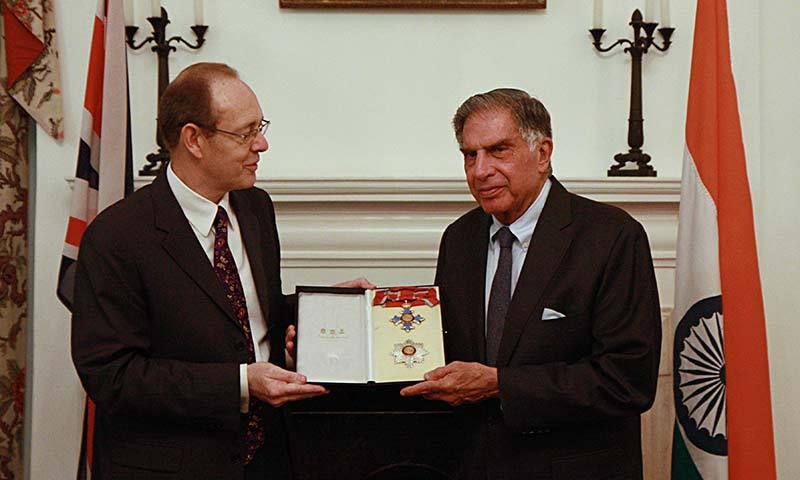
At a well-attended meeting, BBG members welcomed the new Deputy Head of Mission & UKTI, Tammy Sandhu who duly introduced by Bharat Joshi, Deputy High Commissioner – she briefly spoke of her career and expressed pleasure in attending meeting advising members of her role and changes taking place.
With the new Companies Act 2013 coming into force in April, it was appropriate for Hufriz Wadia, Partner of Kochhar & Co to deliver an excellent briefing to members, especially those who were directors responsible for many of the changes and compliance’s.
The Chairman introduced the Guest Speaker, Benjamin Cherian from their long friendship of 45+ years – he had also established the biggest hair product exporter in India and as a life-long Rotarian with history of undertaking CSR projects long before anyone thought of CSR!
Benjamin Cherian spoke of his relations in UK with buyers of his products ND also that he had worked with Unilever’s huge subsidiary in India as a Management Trainee. He then followed through to his work in CSR with Rotary and his family foundation – very inspiring to hear of 100 corporation/ government school premises being re-furbished and re-settling 2004 tsunami fishing villages and people.
Louise made the announcements and David Yates proposed a vote of thanks. .
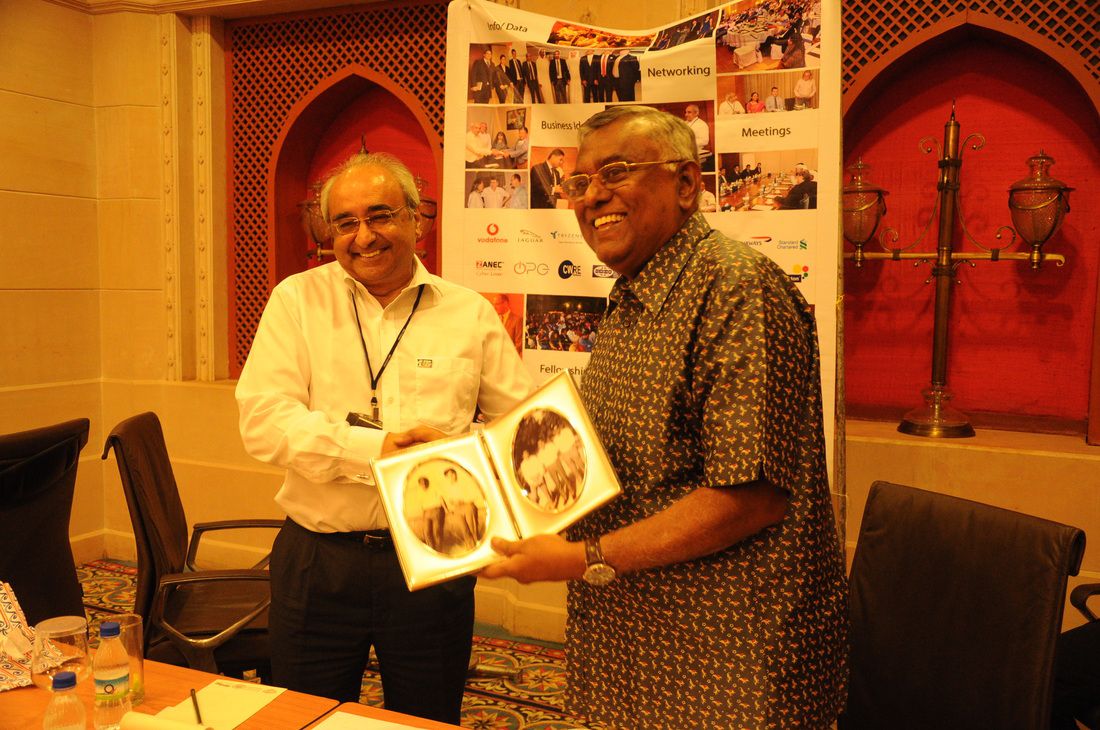
The Chairman was invited by BBG Bangalore to attend the meeting on 5th March. This covered the presentation on Rolls Royce by their President, Marc Drew. Marc put up several displays of the history from car making to aero-engines over 100 years. The company did go through a difficult period after World War II, when it was nationalized. The car company was sold and now belongs to BMW. The aero engines company has grown from strength to strength to power engines for jets, marine engines and various industries world-wide.
Following the presentation the Bangalore Committee Members introduced themselves followed by the 20 attendees. K.C.Janardhan, Secretary invited Christie Cherian to say a few words – The Chairman expressed his pleasure in seeing BBG Bangalore meeting and offered a few tips an how to keep members interested in being part of BBG. He also invited all members to Chennai’s meetings, if and when they visited. A stimulating fellowship over cocktails followed the meeting.
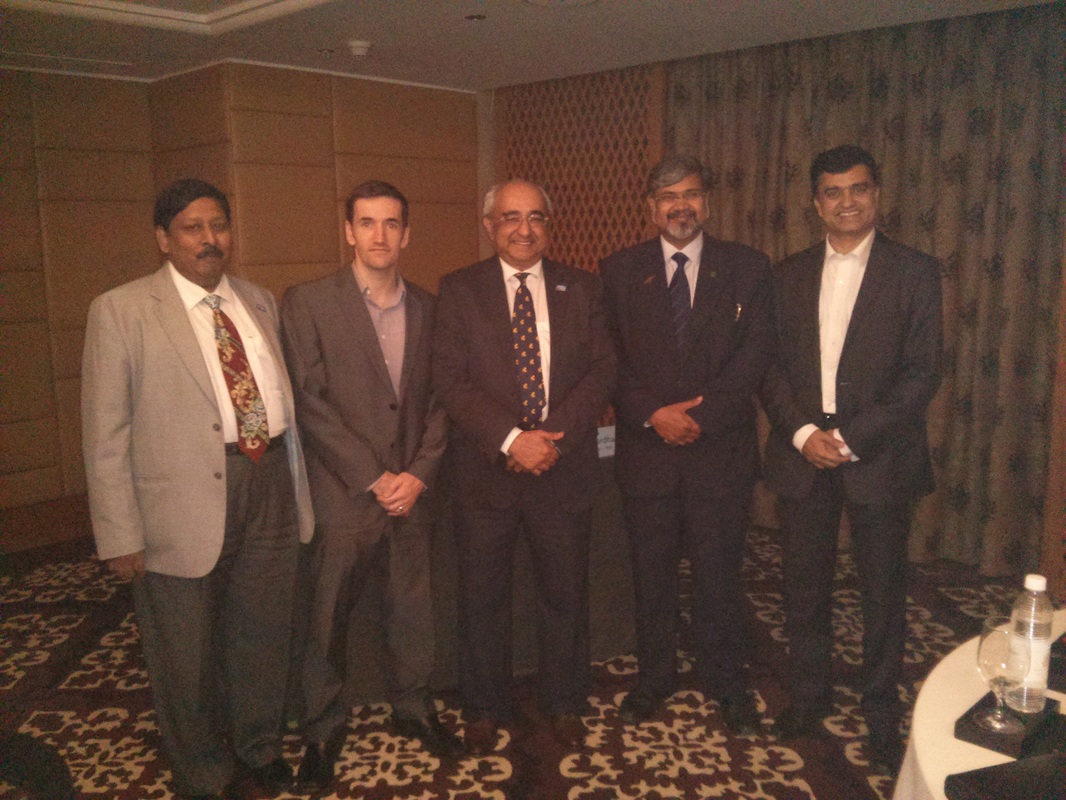
Since our guest speaker, Wendy Stephenson couldnt make it to Chennai due to last minute change in her plan, she sent across her speech which was read by committee member, Balajee. Below is the full speech for your reference:
“The Challenges of a UK company doing business in India
In my career I have worked for long stretches in China, Thailand, Brunei, other parts of Europe and now India. Each of these countries has brought its own set of challenges but none have presented challenges in quite the same degree as India has, and as a consequence contributed to my own growth, for which I am grateful.
I have identified my top five challenges that our business (and I) have faced since setting up here in early 2008 and how I think we have overcome.
1. Understanding when yes means yes and when yes means no.
2. Jugaad – after plan A, there’s plan B, if plan B fails, then plan C and if that doesn’t work…then there’s always Jugaad!
3. Convincing British colleagues and investors to do business in India the Indian way not the British way!
4. Resourcing the team that will make it happen
5. Coping the sensory overload and not putting on weight!
1. Understanding when yes means yes and when yes means No!
This is critical! When I first came to India, I naively thought that when the bank manager said yes to my proposal he meant it. After several months of no progress and a close call with a non-performing account I began to doubt that I could trust the banks again. Only after this did I learn that is impolite to say no in business but then this gave me the insurmountable challenge of never knowing when a yes was a yes and when a yes was a no. The way we overcome this was through localising our team…because after five years I still cannot tell the difference!
2. Jugaad – after plan A, there’s plan B, if plan B fails, then plan C and if that doesn’t work…then there’s always Jugaad!
I am an engineer but I have also inherited a Germanic/Scandinavian nature towards, neat, linear, well defined strategies, objectives and targets. I feel comfortable with this very Anglo-Saxon approach, it’s how I expect the business to run, I look to systems to manage people, not people to manage people and anything not captured in the gaant chart is, quite frankly, alienated, out, trashed. That was until I came to India!
In India I have had to learn to develop business as you would learn to drive on India’s roads! You may know the rules but you don’t necessary follow them – all the time! You are not bound by white lines to keep you straight and linear, you can move sideways and even sometimes go the face of the traffic….but in India, it’s not the wrong way if it gets you to where you need to be! You have to be tolerant of others who share the same route and may nudge you out but you must keep your cool and just nod. If you fight this flow you will never complete the journey or if you do, you will be too frazzled to enjoy your arrival. Instead one has to trust, not in the gaant chart but in the journey, go with the flow, trust and you will eventually arrive.
3. Convincing British colleagues and investors to do business in India the Indian way not the British way!
So in the light of the gannt chart versus jugaad, one of the biggest challenges I face is how to report to my UK colleagues and investors who are used to seeing progress against milestones, risk assessments and mitigation factors all neatly presented in lengthy reports to give them the comfort that everything is under control.
Yet Jugaad it about letting go, not controlling too much…..but coming up with a solution at the last minute that you might never have thought about before. It is about relationships, trust, and risk, not a word that we Brits are very comfortable with.
Even when I present all this information with legal opinions and evidence, still some of our UK colleagues will want to get it vetted by a UK laywer or accountant at even more expense then come back with a lot of questions that might actually be very irrelevant and impossible in the Indian context. It’s a costly exercise.
So how is this best overcome? Our UK colleagues and investors need to learn to trust a little more and make the effort to understand how India works, but our Indian colleagues need to also understand how the UK works and to try and provide information that can be reported in a way that gives them a little more comfort. This is where the true partnership is then forged and will allow your business to succeed where others have failed.
4. Resourcing the team that will make it happen
I am not Indian, I was not brought up in India and I have only started working here in the last five years. So how can I, or any of my UK Colleagues expect me to deliver the business success that we are striving for…….well they did.
Fortunately for me, my previous experience taught me that for an international business to really succeed it needs both expat and local input. Not only that, I am a firm believer as the CEO, that my role is to gather experts around me that will tell me how they are going to do it and to give them the space and the support they need to deliver it.
Our success will be because of our local team, without them, their expertise, their local knowledge and experience, I am very sure that we would struggle to be the business we need to be.
If you are a CEO and your telling your team what to do, you have the wrong team!
5. Coping the sensory overload and not putting on weight!
I took my mother to the cinema to see the film ‘ The most exotic Marigold Hotel’ and the opening scenes reflect the India that is busy, fast, colourful, noisy and apparently chaotic. On seeing these scenes she leant across and whispered to me….’is India really like that?’ I whispered back….’No. It’s worse’!
To a simple, peace-seeking, walker like me, India is sensory overload, the smells, the noises, the colours and the pace all make India this amazing energy that it is and a challenge to my head!
At first I struggled with all its contradictions, the disparity between rich and poor, the corruption, the environmental degradation in the cities and the difficulty in understanding how to do business and most of all…. what ‘Yes’ meant. Some people in the UK had said that India is amazing, it will change you, it’s so spiritual. But to me as an environmentalist – I couldn’t see this, how could there be all this environmental pollution and waste if the country is so spiritual!
And then something amazing happened, I watched an old lady begging on the street from my hotel window. When people walked by she would smile, after a while she got up and walked down the street to a temple where she prayed. She was so apparently, content or happy with her lot that I felt ashamed of myself.
Because all this time, I had been looking in the wrong place. I had been looking outside and not inside. How else can people live in such challenging circumstances and still appear to be some of the happiest people i have ever met. This realisation had led to my own growth and influence the way I conduct business and work with my team with very positive results.
That I think is the secret to doing business in India, you have to change your response to the outside world and not try and change the outside world (India) to suit who you are – otherwise you will fail. If you change your response I believe that you too could calmly drive on a very risky Indian road, taking directions from someone more expert than you, smile when someone almost kills you but above all, you will arrive, one-day.
Oh! And the putting on weight bit, well I am a lot lighter mentally and able to cope very easily with doing business in India – physically, I don’t have a solution about how do overcome this because the food is gorgeous!
I am sorry I couldn’t be with you.
Best wishes,
Wendy”
